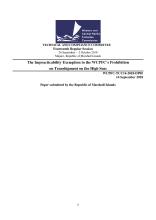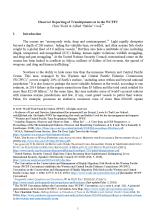The Impracticability Exemption to the WCPFC's Prohibition on Transshipment on the High Seas
The international community has sought to limit or ban-transshipment at sea due to the difficulty it poses in monitoring IUU fishing and controlling its effects. The WCPFC has banned purse seine vessels operating within the WCPFC Convention Area; however, for longliners and other vessels, the WCPFC merely encourages them to conduct transshipment at sea to the extent practicable. Despite proper infrastructure at port, a precedent of other vessels conducting transshipment at port, and insignificant costs, CCMs have used the "impracticability" test to continue transshipping at sea. This paper proposes replacing the "impracticability" test with bright-line rules to put an end to CCMs' patterns of transshipment at sea.
Language

